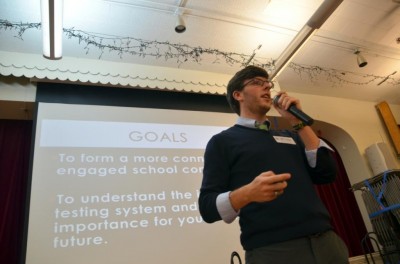By Matthew McCabe
CHICAGO — Luis* was struggling in his sophomore year. His grade-point average was dipping lower; he had missed multiple homework assignments in the past week. Luis said he didn’t have the resources—time, energy, materials—necessary to meet the academic performance I expected of him in my world history class.
So, we sat down side by side and faced the problem before us. We gathered as many data points as possible—grade reports and test scores, teacher feedback, information from his family and home life—and we started to look for solutions.
Every teacher knows this process. We understand that if we are to make an impact on the habits of and outcomes for a student, our tactics matter. Relationships matter. Tone matters. The data points on which you base your discussion matter.
And so it is with education policy writ large. In Chicago these past few months, negotiators for the Chicago Teachers Union and the Chicago Public Schools came to the table—an admirable first step. But, unfortunately, they sat facing each other rather than facing the challenges at hand. Each side argued from a mentality of winning and losing, thinking chiefly of gains and losses. Each side wrongly assumed a lack of common purpose. And so, despite the dust settling on a historic strike, major challenges remain for the Chicago public-school system as a whole.

The author speaking this fall at a parent night at Pritzker College Prep, where he teaches world history. (Photo courtesy of Matthew McCabe)
This cuts to the core challenges at the heart of the education reform debate, both here in Chicago and nationally. The debate’s current paradigm is not centered on the end goals that both sides share, as division rather than collaboration is the focus.
All parties—teachers, parents, policymakers, district and union leaders—share an interest in high-quality school facilities, getting greater numbers of social workers in the schools and the like. All sides want to recognize and retain good teachers and support those who are struggling. All sides want better outcomes for children. And yet despite this, the debates tend to be handled as tugs of war—at the end of which the rope has moved little and common interests remain neglected.
So, the question shouldn’t be, “Did Chicago provide an example of principled negotiation in the past few months?” It did not.
A more productive question is, “Can Chicago move forward and provide a model for nuanced, respectful dialogue among stakeholders?” On this point, there are glimmers of hope.
Here’s one.
In August, more than 1,200 Chicago teachers gathered for a professional development conference on the Common Core State Standards. The conference, called Collaborate Chicago, engaged educators from both the elementary and high-school levels in sessions geared toward seamlessly integrating the new standards into our classrooms. On the surface this doesn’t seem all that special—teachers, like all professionals, seek out ways to improve their practice. But in this case it was special, because the conference was jointly sponsored by the Chicago Teachers Union and the Chicago Public Schools.
There are lessons here. First, there’s common ground. CTU and CPS both acknowledged a need for further professional development around the Common Core. Both organizations, despite other tensions, wanted teachers to be able to implement the new standards as soon as possible and as effectively as possible. (Bear in mind that this conference took place at a time when negotiators for both CTU and CPS said they remained “far apart” in contract negotiations.)
The second lesson is that we can accomplish more together than we can separately. The CPS central office provided institutional backing for the event and got the word out to charter school teachers, too. And the union promoted the event at the grassroots level and mobilized its teachers to attend. Absent either party, the conference wouldn’t have been as successful.
Lastly—and unsurprisingly—the conference was effective because it was planned and led by teachers. Uniquely situated at the nexus of policy and practice, teachers were not only able to assess the need for further training on the Common Core, but also to develop solutions to the challenges and implement them effectively.
When it comes to systemic education reform, there are no doubt delicacies of implementation, and differences of opinion about the relative importance of various initiatives. But these differences are surmountable as long as there is a shared end goal: improved outcomes for children.
For true—and substantial—education reform to happen, stakeholders must embrace nuance and face the challenges at hand with a common purpose. Labeling sides as “money-grubbing,” “corporate reformers” or “lazy, ineffective union slackers” is counterproductive.
My goal with Luis wasn’t to “win.” It was to change the situation. I wanted to see increased performance. I had to engage in a discussion with Luis, not against him. I had to involve him in the process. I had to believe, before we even began our conversation, that he wanted to improve, too—otherwise we weren’t going anywhere.
Education leaders should follow the same model: assume good intentions, embrace nuance publicly and attack challenges collaboratively. Otherwise, we aren’t going anywhere.
*Luis is a pseudonym, used here to protect the student’s identity.
Matthew McCabe is a World History and AP World History teacher at Pritzker College Prep in Chicago. He was a 2012 Leadership of Educational Equity Policy Fellow and is a current Teach Plus Policy Fellow in Chicago. Formerly, McCabe was a third-grade teacher and Chicago Teachers Union member at George B. Swift Elementary.
